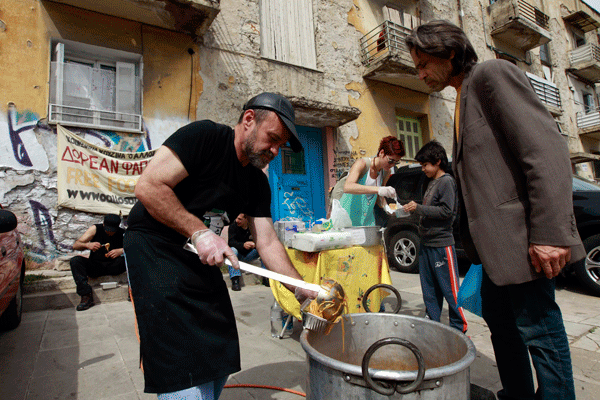
WASHINGTON (CNS) — While there is no roadmap to solving Europe’s economic crisis, the Catholic Church — with its history of serving the poor — can help in the face of government austerity measures, longtime observers said.
“At the moment, if you gather three European economists, you have four options” of how to solve the crisis, said Raul Gonzalez Fabre, professor of economics and ethics at Comillas Pontifical University in Madrid.
However, he and other European observers said the Catholic Church can help guide discussions so that a balance is achieved among government, charitable agencies and private enterprise.
While Europe’s economic situation poses serious challenges that are expected to take years to resolve, observers such as British Jesuit Father Frank Turner say the church’s steady hand in serving the poor and assisting the newly unemployed will help cement its role as a key adviser in the development of economic solutions aimed at the common good in the 17-nation euro zone.
It’s not that the church offers specific answers. Father Turner, who works at the Jesuit European Social Center in Brussels, pointed to Pope Benedict XVI’s 2009 encyclical “Caritas in Veritate” (“Charity in Truth”) as a basic framework for action. In broad terms, the document calls for a balance between global development and the common good.
Father Turner also cited a January commentary by the Commission of the Bishops’ Conference of the European Community that addressed the importance of developing “a highly competitive social market economy” in response to the growing financial crisis.
In “A European Community of Solidarity and Responsibility,” the bishops called for “equal balancing of the principles of freedom and solidarity.” In particular, they cite the need for binding “freedom of the market with the principle of justice and the commandment to love of neighbor.”
Gonzalez told Catholic News Service that the economic crisis “may be the opportunity (for the church and governments) to work together in order to help the old and new poor survive the situation.”
“New bridges in charity and social commitment may ease doctrinal antagonisms and help create deeper dialogues on culture in the future,” he added.
Overall unemployment in the euro zone rose to 10.9 percent in March, leading to restlessness among workers.
Seeking change, voters have turned to leaders from across the political spectrum in the hope that someone will ease the economic crisis. In Spain in November, where official unemployment has hovered at 24 percent for months, voters ousted the socialist government in favor of the conservative Popular Party.
Next door in France, voters May 6 opted for socialist Francois Hollande over Nicolas Sarkozy, the moderately conservative incumbent, for president. Sarkozy’s austerity measures seemed to be the target of voter backlash.
In Greece, where unemployment stood at 21.7 percent, voters also took aim at austerity measures by propelling the hard-left SYRIZA party to a second-place finish in May 6 elections. Party leaders May 15 blocked any deal with the European Union on a bailout, ending the possibility of a compromise in the formation of a coalition government with mainline parties. New elections were scheduled for June as fears of bankruptcy loomed.
The European Union, largely guided by German government demands, has offered its most recent financial recovery plans to Greece and France. Hollande and SYRIZA’s leaders have stepped back from the deals, saying that Germany should not be the primary driver behind the efforts.
“It is clear that extreme parties gained consensus because European decision-makers did not take into account the social and human consequences of the austerity plans,” said Raul Caruso of the Institute of Economic Policy at the Catholic University of the Sacred Heart in Milan.
He called for economic policies that primarily benefit citizens and for leaders to pay better attention to the needs of citizens in the future if they are concerned about a backlash in future elections. He also suggested that people would agree with austerity measures if they were perceived as “just and fair.”
“In Europe, the widespread sentiment is that decision-makers are completely unable to meet these needs,” he said. “The European leaders seem to lack any imaginative and productive vision of the future.”
Talk has surfaced that Greece may leave the euro zone, returning to its old currency, the drachma. Hollande and German Chancellor Angela Merkel emerged from a May 15 meeting to say they want Greece to keep using the euro.
If Greece exits the euro zone, the move is expected to pose serious challenges in the short term. In the long term, the move may offer the Mediterranean country a chance to forge a new economy as Greek products become more competitive in the global marketplace, explained Erasmus K. Kersting, assistant professor of economics at Villanova University in Philadelphia.
“The average citizen in Greece would see their purchasing power fall at first, but the hope is that the recovery would be swift and strong,” Kersting, a native of Hannover, Germany, said in an email. “That, in turn, would mean a dramatic fall in unemployment and hopefully also a reversal of the feelings of anger and helplessness that seem to currently prevail in the country.”
Regardless of who is in power, economic reforms are necessary, said Laura Gonzalez, a native of Spain who is assistant professor of finance and business economics at Fordham University in New York.
She predicted that new bailout agreements eventually would be in place to allow Greece and France to ease their way out of their economic crises.
“Everyone is convinced about the need to change the current situation,” she said. “The status quo is not sustainable.”
— By Dennis Sadowski, Catholic News Service






